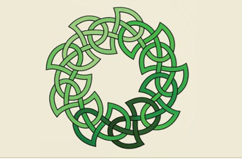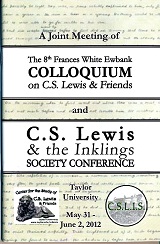Event Title
Academic Paper Session 3-A
Location
Rupp 203
Start Date
1-6-2012 2:00 PM
Description
"Circumspection Regarding Introspection in the Thought of C.S. Lewis" - Mark Smith & Nick DeNeff
Much popular Christian spirituality would appear to focus on the critical role, even pride of place for something we will call Christian introspection. Looking within oneself, self-examination, soul-searching, how can these not be absolutely essential for our spiritual health and growth? That we contend C.S. Lewis had much to say about introspection, self-examination, and self-knowledge would hardly be a surprise to anyone and not worth five minutes at a conference. However, what may be surprising is that a whole lot of what Lewis said on these subjects is couched in language of caution, vigilance and circumspection. We want to pursue this question, attempting to discover why Lewis had at best a double attitude towards the matter of looking closely, carefully, and continually at oneself.
"A Tryst with the Transcendentals: C.S. Lewis on Beauty, Truth, and Goodness, Part II: Truth" - Donald Williams
In an age of Post-Modernism and Post-Foundationalism, the very concept of truth finds itself subject to deconstruction. C.S. Lewis held to the old "correspondence theory" of truth, but did so in a way that withstands contemporary assaults better than many traditional formulations because he sought to integrate Reason and Imagination in ways not typical of earlier philosophy. Essays like "Bluspels and Flalansferes" provide a framework for understanding Lewis's statements on the nature of truth. They make possible a view of truth that is neither relativist nor reductive, but rather profoundly humane.
"Facts and Meaning: From Word to Myth" - David Rozema
The 1948 Anscombe-Lewis Debate is often cited as an example of how two of England's finest minds of the twentieth century -- C.S. Lewis and Ludwig Wittgenstein -- would have debated had they ever had the chance. Anscombe was a student of Wittgenstein's, and their debate is a case in point for showing the distinction between investigating a proposition's truth and investigating its sense, its meaning. Using remarks from the works of both men, I will show that their understanding of the meaning of language -- from single words to complete stories, including myths -- is remarkably similar; and immensely helpful.
Event Type
Paper
Link to Papers
Circumspection Regarding Introspection in the Thought of C.S. Lewis (Not available)
A Tryst with the Transcendentals: C.S. Lewis on Beauty, Truth, and Goodness Part II: Truth
Academic Paper Session 3-A
Rupp 203
"Circumspection Regarding Introspection in the Thought of C.S. Lewis" - Mark Smith & Nick DeNeff
Much popular Christian spirituality would appear to focus on the critical role, even pride of place for something we will call Christian introspection. Looking within oneself, self-examination, soul-searching, how can these not be absolutely essential for our spiritual health and growth? That we contend C.S. Lewis had much to say about introspection, self-examination, and self-knowledge would hardly be a surprise to anyone and not worth five minutes at a conference. However, what may be surprising is that a whole lot of what Lewis said on these subjects is couched in language of caution, vigilance and circumspection. We want to pursue this question, attempting to discover why Lewis had at best a double attitude towards the matter of looking closely, carefully, and continually at oneself.
"A Tryst with the Transcendentals: C.S. Lewis on Beauty, Truth, and Goodness, Part II: Truth" - Donald Williams
In an age of Post-Modernism and Post-Foundationalism, the very concept of truth finds itself subject to deconstruction. C.S. Lewis held to the old "correspondence theory" of truth, but did so in a way that withstands contemporary assaults better than many traditional formulations because he sought to integrate Reason and Imagination in ways not typical of earlier philosophy. Essays like "Bluspels and Flalansferes" provide a framework for understanding Lewis's statements on the nature of truth. They make possible a view of truth that is neither relativist nor reductive, but rather profoundly humane.
"Facts and Meaning: From Word to Myth" - David Rozema
The 1948 Anscombe-Lewis Debate is often cited as an example of how two of England's finest minds of the twentieth century -- C.S. Lewis and Ludwig Wittgenstein -- would have debated had they ever had the chance. Anscombe was a student of Wittgenstein's, and their debate is a case in point for showing the distinction between investigating a proposition's truth and investigating its sense, its meaning. Using remarks from the works of both men, I will show that their understanding of the meaning of language -- from single words to complete stories, including myths -- is remarkably similar; and immensely helpful.


